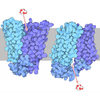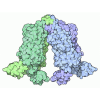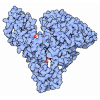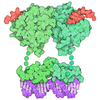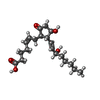+ Open data
Open data
- Basic information
Basic information
| Entry | Database: PDB / ID: 8kgw | ||||||
|---|---|---|---|---|---|---|---|
| Title | Molecular mechanism of prostaglandin transporter SLCO2A1 | ||||||
 Components Components | Solute carrier organic anion transporter family member 2A1 | ||||||
 Keywords Keywords | MEMBRANE PROTEIN / SLCO family | ||||||
| Function / homology |  Function and homology information Function and homology informationDefective SLCO2A1 causes primary, autosomal recessive hypertrophic osteoarthropathy 2 (PHOAR2) / Transport of organic anions / sodium-independent organic anion transport / sodium-independent organic anion transmembrane transporter activity / prostaglandin transport / prostaglandin transmembrane transporter activity / lipid transporter activity / lipid transport / basal plasma membrane / basolateral plasma membrane ...Defective SLCO2A1 causes primary, autosomal recessive hypertrophic osteoarthropathy 2 (PHOAR2) / Transport of organic anions / sodium-independent organic anion transport / sodium-independent organic anion transmembrane transporter activity / prostaglandin transport / prostaglandin transmembrane transporter activity / lipid transporter activity / lipid transport / basal plasma membrane / basolateral plasma membrane / lysosome / membrane / plasma membrane Similarity search - Function | ||||||
| Biological species |  Homo sapiens (human) Homo sapiens (human) | ||||||
| Method | ELECTRON MICROSCOPY / single particle reconstruction / cryo EM / Resolution: 3.4 Å | ||||||
 Authors Authors | Li, Y.H. / Qu, Q.H. / Zhu, Z.N. / Chao, Y.L. / Zhou, Z.X. | ||||||
| Funding support |  China, 1items China, 1items
| ||||||
 Citation Citation |  Journal: To Be Published Journal: To Be PublishedTitle: Molecular mechanism of prostaglandin transporter SLCO2A1 Authors: Li, Y.H. / Qu, Q.H. | ||||||
| History |
|
- Structure visualization
Structure visualization
| Structure viewer | Molecule:  Molmil Molmil Jmol/JSmol Jmol/JSmol |
|---|
- Downloads & links
Downloads & links
- Download
Download
| PDBx/mmCIF format |  8kgw.cif.gz 8kgw.cif.gz | 104 KB | Display |  PDBx/mmCIF format PDBx/mmCIF format |
|---|---|---|---|---|
| PDB format |  pdb8kgw.ent.gz pdb8kgw.ent.gz | 76.6 KB | Display |  PDB format PDB format |
| PDBx/mmJSON format |  8kgw.json.gz 8kgw.json.gz | Tree view |  PDBx/mmJSON format PDBx/mmJSON format | |
| Others |  Other downloads Other downloads |
-Validation report
| Summary document |  8kgw_validation.pdf.gz 8kgw_validation.pdf.gz | 431.3 KB | Display |  wwPDB validaton report wwPDB validaton report |
|---|---|---|---|---|
| Full document |  8kgw_full_validation.pdf.gz 8kgw_full_validation.pdf.gz | 433.7 KB | Display | |
| Data in XML |  8kgw_validation.xml.gz 8kgw_validation.xml.gz | 11.5 KB | Display | |
| Data in CIF |  8kgw_validation.cif.gz 8kgw_validation.cif.gz | 17.5 KB | Display | |
| Arichive directory |  https://data.pdbj.org/pub/pdb/validation_reports/kg/8kgw https://data.pdbj.org/pub/pdb/validation_reports/kg/8kgw ftp://data.pdbj.org/pub/pdb/validation_reports/kg/8kgw ftp://data.pdbj.org/pub/pdb/validation_reports/kg/8kgw | HTTPS FTP |
-Related structure data
| Related structure data |  37234MC 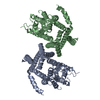 8kgiC  8kgvC M: map data used to model this data C: citing same article ( |
|---|---|
| Similar structure data | Similarity search - Function & homology  F&H Search F&H Search |
- Links
Links
- Assembly
Assembly
| Deposited unit | 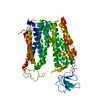
|
|---|---|
| 1 |
|
- Components
Components
| #1: Protein | Mass: 70103.898 Da / Num. of mol.: 1 Source method: isolated from a genetically manipulated source Source: (gene. exp.)  Homo sapiens (human) / Gene: SLCO2A1, OATP2A1, SLC21A2 Homo sapiens (human) / Gene: SLCO2A1, OATP2A1, SLC21A2Production host: Mammalian expression vector EGFP-MCS-pcDNA3.1 (others) References: UniProt: Q92959 |
|---|---|
| #2: Chemical | ChemComp-P2E / ( |
| Has ligand of interest | Y |
| Has protein modification | Y |
-Experimental details
-Experiment
| Experiment | Method: ELECTRON MICROSCOPY |
|---|---|
| EM experiment | Aggregation state: PARTICLE / 3D reconstruction method: single particle reconstruction |
- Sample preparation
Sample preparation
| Component | Name: Membrane Protein sample / Type: COMPLEX / Entity ID: #1 / Source: RECOMBINANT |
|---|---|
| Source (natural) | Organism:  Homo sapiens (human) Homo sapiens (human) |
| Source (recombinant) | Organism: Mammalian expression vector Flag-EGFP-MCS-pcDNA3.1 (others) |
| Buffer solution | pH: 7.3 |
| Specimen | Embedding applied: NO / Shadowing applied: NO / Staining applied: NO / Vitrification applied: YES |
| Vitrification | Cryogen name: ETHANE |
- Electron microscopy imaging
Electron microscopy imaging
| Experimental equipment |  Model: Titan Krios / Image courtesy: FEI Company |
|---|---|
| Microscopy | Model: FEI TITAN KRIOS |
| Electron gun | Electron source:  FIELD EMISSION GUN / Accelerating voltage: 300 kV / Illumination mode: FLOOD BEAM FIELD EMISSION GUN / Accelerating voltage: 300 kV / Illumination mode: FLOOD BEAM |
| Electron lens | Mode: BRIGHT FIELD / Nominal defocus max: 2000 nm / Nominal defocus min: 1500 nm / Cs: 2.7 mm |
| Image recording | Electron dose: 50 e/Å2 / Film or detector model: FEI FALCON IV (4k x 4k) |
- Processing
Processing
| CTF correction | Type: PHASE FLIPPING AND AMPLITUDE CORRECTION | ||||||||||||||||||||||||
|---|---|---|---|---|---|---|---|---|---|---|---|---|---|---|---|---|---|---|---|---|---|---|---|---|---|
| 3D reconstruction | Resolution: 3.4 Å / Resolution method: FSC 0.143 CUT-OFF / Num. of particles: 139502 / Symmetry type: POINT | ||||||||||||||||||||||||
| Refine LS restraints |
|
 Movie
Movie Controller
Controller





 PDBj
PDBj